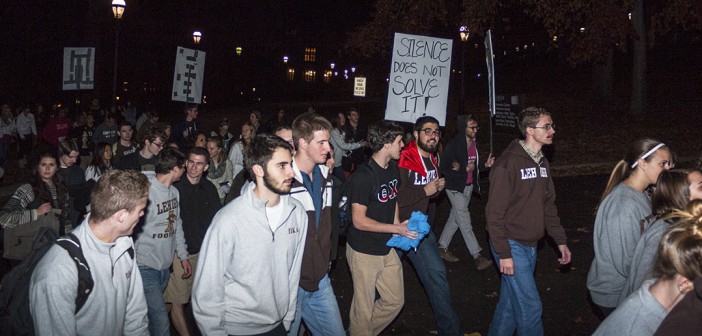“What should I do?”
A young black male student posed this question to Tavis Smiley, a talk show host, author and political commentator, who presented at Lehigh on Sept. 30 on the racial inequality that exists in America.
Ted Morgan, a Lehigh political science professor, recalled the powerful moment. He said Smiley stopped signing the book he was autographing and answered, telling the young man to be smart. When the police tell him to do something, he should do it. He should be careful.
But above all else, he shouldn’t lose his voice. He should make sure he discusses things and speaks up about things that affect him.
Only about 2 percent of Lehigh’s student population was there to hear Smiley’s response to the simple but loaded question, as well as Smiley’s rousing call for social activism as the way to change the course of politics and social norms.
Morgan said, historically, Lehigh has not had a politicized culture of activism and impassioned discussion on political issues. Morgan has taught a variety of classes on political activism at Lehigh since 1976.
In a survey of 163 students conducted by The Brown and White, only 4.9 percent of students said in general, Lehigh students care about politics, while just more than half responded that Lehigh students care “somewhat.”
Caitlin Grady, ’17, vouched for this relative disinterest, remembering the Lehigh student activist group “From Beneath the Rug” leading protests over poor race-relations at Lehigh in October 2013.
“Nobody really paid attention until we started seeing racist slurs printed on paper posted around campus,” Grady said. “Then when people realized it was some kind of movement, they were like, ‘Oh, OK whatever,’ and forgot about it again. It wasn’t a big deal for people that weren’t involved.”
Morgan said issues dealing with one’s identity are often the most prevalent kind of political discussion and activity on campus. Those who feel oppressed because of their identity — their race, gender, sexuality or religion — are much more likely to speak up about politics and how it affects them.
But while Morgan said there has been an undercurrent of race-relations based political activity on Lehigh’s campus since the early 2000s, and applauds those for speaking up, it follows the general script of the Smiley talk: attended and paid attention to by those directly affected.
Morgan and Saladin Ambar, the chair of the political science department, believe a less politicized culture at Lehigh has come about because of the prominence of the engineering and business schools. Because of this, Lehigh has attracted students who are not necessarily the activist or politically-minded student, though Ambar believes that has been changing.
Ambar said though the level of interest, as well as number of majors concerned with global issues, political issues and activism have grown over the past 25 years, they still lag behind the other majors in number and influence on campus.
Ambar said he also looks to the broader Lehigh Valley community when considering a lack of politicized culture.
“Culturally, the Lehigh Valley has been very much about Bethlehem Steel and a few major manufacturing companies,” Ambar said. “As a result, I think it’s been not only here at Lehigh but at other colleges historically — Moravian, Cedar Crest, Muhlenberg — not as politically active as some of the larger universities in big cities around the country.”
But as much as Lehigh’s “corporate conservatism” driven by its dominance of business and engineering students and geographical location has kept it from being a campus where political culture thrives, there have been trends in college-aged students nationally that reveal less interest and participation in the democratic process.
Pew Research data shows millennials express less interest in politics and discuss it less than Generation Xers and Baby Boomers, by between 10 and 20 percentage points each.
The Campus Vote Project, launched by the Fair Elections Legal Network to reduce barriers for student voting, reports that beyond not being interested in or talking about politics, only 17 percent of voters ages 18-24 voted in the 2014 elections.
Michael Miller, ’17, an IDEAS major focusing on mechanical engineering and sustainable development, said the trends in millennials not voting or not having as much interest aren’t shocking to him. Miller said he believes younger people care more because they have experiences that reveal just how impactful politics are on everyday life.
For Miller, it was an economics class he took junior year of high school that made him attentive to politics. But he’s hopeful everyone will have an experience unique to them that will ultimately lead them to pay attention, have opinions and participate.
Ambar and Morgan both mentioned another influence in a lack of political discussion and activism among young people is the pervasive influence of media and technology on the millennial generation that did not exist for the previous generations.
“That ‘feeling part of something bigger than just me’ is important to people,” Morgan said. “In a way, this hashtag activism, or slacktivism — liking things or signing petitions — gives people the sense of, ‘Well, I can at least to do that.’”
Rob Rosenthal and Lois Brown, professors at Wesleyan University, noted the difference in student activism in the 1960s and today by the influence of technology. In an August 2014 Huffington Post piece, they described a change in activism.
“Numerous events suggest that students today are not abandoning activism but using new forms of activism: replacing confrontation with dialogue, lobbying, and direct service provision and ‘organizing’ locally and globally without ever joining hands,” Rosenthal and Brown wrote. “Some even suggest that this contemporary activism diminishes significant personal risk and thus becomes less heroic.”
Pew Research reports 61 percent of millennials get their news from Facebook. This trend, the tactics of mass media and the virtual activism that replaces confrontation and group organization show Ambar and Morgan the seeds of a “virtual citizenry” being created.
“The masses of the people are silent and entertained, and somehow willfully subjecting themselves to forces of the market and entertainment while not taking on the tough burden of citizenship,” Ambar said.
Morgan and Ambar both worry this kind of attitude toward democracy is a weaker one — a spectator democracy, or a democracy in which the public loses its stake in politics. Morgan noted it’s even easier to lose a stake in politics if one’s identity is not being challenged or affected by politics, which results in only those who feel personally affected attending events, organizing and speaking up.
According to the survey conducted by The Brown and White, 37 percent of Lehigh students said although voting is important, they do not feel their vote makes a difference.
“An issue with people caring is that they don’t think their vote means much, and they don’t trust the system,” Miller said. “If they think that the government and politicians are just going to do what they’re going to do, they won’t learn how to register, they won’t try to be involved.”
Morgan does not necessarily blame students for feeling powerless, because he said little systemic change has been made over the years. He recalls one particular paper written by a student in his “Social Movements and Legacies of the 1960s” class, who lamented that all their generation could really do is make their living and make sure their children “are going to be OK,” because that’s all they really have power over.
The rest, they don’t.






Comment policy
Comments posted to The Brown and White website are reviewed by a moderator before being approved. Incendiary speech or harassing language, including comments targeted at individuals, may be deemed unacceptable and not published. Spam and other soliciting will also be declined.
The Brown and White also reserves the right to not publish entirely anonymous comments.